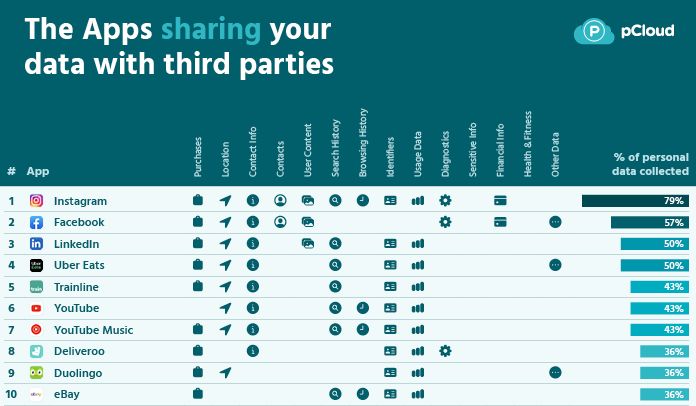Facebook-owned Instagram and Facebook itself have topped a recent study of the most invasive apps in the world
This has increased concerns around WhatsApp privacy policy, which seeks to share more information with Facebook-owned companies
The data shared with third-party partners includes details about purchases made from Instagram or Facebook ads, browsing activity and other personal data

To the surprise of perhaps no one, Facebook-owned Instagram and Facebook itself have topped a recent study of the most invasive apps in the world. This, by itself, should not worry those who don’t use either of those social media platforms, but it’s also the reason why one needs to be more than a little concerned about the WhatsApp privacy policy, which seeks to share more information with Instagram, Facebook and other Facebook-owned companies and its partners.
Cloud storage platform pCloud recently released a report based on data collated from the Apple App Store privacy labels displayed in the latest iOS builds. The research indicated that Instagram was the worst offender when it comes to sharing user data with third-parties or for marketing purposes, while Facebook was second.
The report said Instagram shares 79% of user data with other companies, and uses 86% of this data for its own marketing purposes, whileFacebook shares 56% of data with other companies and collects the same amount of data for marketing as Instagram. Incidentally, WhatsApp did not feature among the top 50 list of the most invasive apps. The data shared with third-party partners includes details about purchases made after clicking on Instagram or Facebook ads, other personal data that the platforms scrape based on user activity as well as browsing history through cookies and other trackers.
“With over one billion monthly active users it’s worrying that Instagram is a hub for sharing such a high amount of its unknowing users’ data,” pCloud said.
What’s most worrisome is that WhatsApp will also come under this data collecting and sharing regime with the new privacy policy, albeit as the company claims, this will only pertain to communications between businesses and users, and not for personal chats.

Under the new terms and conditions, which will go into effect from May 15, 2021, WhatsApp would share transaction data, mobile device information, IP addresses, and other data on how users interact with businesses on WhatsApp and with Facebook group companies, including Instagram. While this seems standard in the world of massive tech behemoths who have hands in multiple pies, the real problem in the case of WhatsApp is as the policy says — it’s their way or highway, since there is no way for users to opt-out of this policy.
Amid the raging controversy with millions joining WhatsApp rivals Signal and Telegram, the Indian government filed a counter-affidavit in the Delhi High Court last week, looking to restrain WhatsApp from rolling out the controversial update, or give users an opt out option. In the lawsuit ‘Dr Seema Singh v. Union Of India’, the court had last month sought responses from the central government. The government responded that pending the passing of the Personal Data Protection Bill, 2019, the Information Technology Act, 2000 and the rules made under it, constitute the data protection regime in the country, which WhatsApp would be violating with its new policy.
The government has detailed various counts of violation of the IT Rules, 2011, by WhatsApp and claimed that the new privacy policy fails to specify the types of sensitive personal data (SPD) being collected and has used very generic terms to describe the kinds of data collected. The government has argued that the privacy policy contains no distinction between personal data or sensitive personal data which is being collected.
And that’s not even accounting for the data shared by the platform with other Facebook companies, who may in turn use it for monetisation or for marketing purposes as well. This was the original integrated platform vision first floated by Mark Zuckerberg in January 2019, when he hinted that Facebook, Instagram and WhatsApp will soon grow from the same fountain of data. But Zuckerberg and Facebook will first have to contend with the Indian government and various internet rights groups that are looking to fight off the WhatsApp ‘privacy’ policy.










